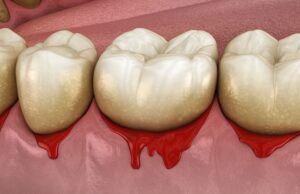Research published in the Journal of Clinical Periodontology suggests that patients with gum disease could carry a higher risk of severe complications related to COVID-19. While vaccinations have led to milder cases of COVID-19, this danger is still real. And with about half of American adults suffering from gum disease, this issue is also prevalent.
So you should not neglect your gums as you pursue a healthy smile. Though when it comes to caring for your gums, it may help to know where to start. Read on to learn why you should seek preventative care when it comes to your periodontal health.

Do I Have Gum Disease?
Gum disease refers to a common type of infection in the gum tissue. In its early stage, gingivitis, you might notice bleeding, swelling, and redness in the gums. However, this inflammation could also occur for acute reasons like harsh teeth brushing.
But if these symptoms persist, you might have gum disease. As the infection progresses, you might also experience gum recession, bad breath, and tooth discoloration. This occurs when bacteria spread from the gums to the teeth and jaw.
Some patients will not have any of these symptoms though and still have gum disease. This is why attending routine check-ups with your dentist is so crucial to your gum health. A dentist can conduct a periodontal disease screening to look for signs of infection and then offer swift treatment for the problem.
How Will My Dentist Treat Gum Disease?
When a dentist diagnoses you with gum disease, they can start treating this infection right away. They will begin with a thorough cleaning of your teeth and gums, scraping away plaque and excess bacterial build-up, especially near the gum line. This extensive cleaning method is known as scaling and root planing.
If the disease still persists, the dentist will employ laser dental tools to remove damaged gum tissue and eradicate the infection. Advanced cases of gum disease or infections that continue after this therapy may need gum surgery.
Your dentist can also give you antibacterial rinses that will work to balance natural oral bacteria. This will alleviate uncomfortable periodontal symptoms while also reducing your likelihood of the infection returning.
How Can I Take Care of My Gums?
The best way to promote good gum health and avoid contracting gum disease is to practice good oral hygiene. Scrubbing away plaque and other harmful residues will make it harder for bacteria to spread to the gums. So make sure you brush your teeth at least twice a day and floss on a daily basis.
Maximize preventative dental care by also attending routine teeth cleanings with your dentist. Consult with your dentist about finding a care plan that will suit the unique needs of your smile. For instance, you might benefit from using antibacterial hygienic supplies to fight aggressive oral bacteria. And do not delay discussing any concerns about your gums with your dentist.
